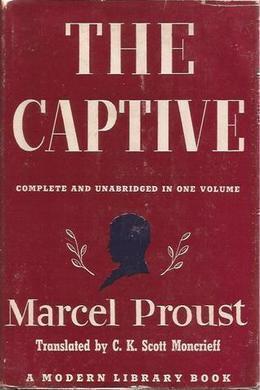
-
EPUB 463 KB
-
Kindle 661 KB
-
Support epubBooks by making a small $2.99 PayPal donation purchase.
Description
In The Captive, Proust’s narrator describes living in his mother’s Paris apartment with his lover, Albertine, and subsequently falling out of love with her. The Prisoner (also translated as The Captive) is the first volume of the section within In Search of Lost Time known as the Albertine novel. The name Albertine first appears in Proust’s notebooks. The material in volume 5 and 6 were developed during the hiatus between the publication of volumes 1 and 2 and they are a departure of the original three-volume series originally planned by Proust. This is the first of Proust’s books published posthumously.
706 pages with a reading time of ~10.75 hours (176552 words), and first published in 1923. This DRM-Free edition published by epubBooks, 2014.
Community Reviews
There are currently no other reviews for this book.
Excerpt
At daybreak, my face still turned to the wall, and before I had seen above the big inner curtains what tone the first streaks of light assumed, I could already tell what sort of day it was. The first sounds from the street had told me, according to whether they came to my ears dulled and distorted by the moisture of the atmosphere or quivering like arrows in the resonant and empty area of a spacious, crisply frozen, pure morning; as soon as I heard the rumble of the first tramcar, I could tell whether it was sodden with rain or setting forth into the blue. And perhaps these sounds had themselves been forestalled by some swifter and more pervasive emanation which, stealing into my slumber, diffused in it a melancholy that seemed to presage snow, or gave utterance (through the lips of a little person who occasionally reappeared there) to so many hymns to the glory of the sun that, having first of all begun to smile in my sleep, having prepared my eyes, behind their shut lids, to be dazzled, I awoke finally amid deafening strains of music. It was, moreover, principally from my bedroom that I took in the life of the outer world during this period. I know that Bloch reported that, when he called to see me in the evenings, he could hear the sound of conversation; as my mother was at Combray and he never found anybody in my room, he concluded that I was talking to myself. When, much later, he learned that Albertine had been staying with me at the time, and realised that I had concealed her presence from all my friends, he declared that he saw at last the reason why, during that episode in my life, I had always refused to go out of doors. He was wrong. His mistake was, however, quite pardonable, for the truth, even if it is inevitable, is not always conceivable as a whole. People who learn some accurate detail of another person’s life at once deduce consequences which are not accurate, and see in the newly discovered fact an explanation of things that have no connexion with it whatsoever. When I reflect now that my mistress had come, on our return from Balbec, to live in Paris under the same roof as myself, that she had abandoned the idea of going on a cruise, that she was installed in a bedroom within twenty paces of my own, at the end of the corridor, in my father’s tapestried study, and that late every night, before leaving me, she used to slide her tongue between my lips like a portion of daily bread, a nourishing food that had the almost sacred character of all flesh upon which the sufferings that we have endured on its account have come in time to confer a sort of spiritual grace, what I at once call to mind in comparison is not the night that Captain de Borodino allowed me to spend in barracks, a favour which cured what was after all only a passing distemper, but the night on which my father sent Mamma to sleep in the little bed by the side of my own. So it is that life, if it is once again to deliver us from an anguish that has seemed inevitable, does so in conditions that are different, so diametrically opposed at times that it is almost an open sacrilege to assert the identity of the grace bestowed upon us. When Albertine had heard from Françoise that, in the darkness of my still curtained room, I was not asleep, she had no scruple about making a noise as she took her bath, in her own dressing-room. Then, frequently, instead of waiting until later in the day, I would repair to a bathroom adjoining hers, which had a certain charm of its own. Time was, when a stage manager would spend hundreds of thousands of francs to begem with real emeralds the throne upon which a great actress would play the part of an empress. The Russian ballet has taught us that simple arrangements of light will create, if trained upon the right spot, jewels as gorgeous and more varied. This decoration, itself immaterial, is not so graceful, however, as that which, at eight o’clock in the morning, the sun substitutes for what we were accustomed to see when we did not arise before noon. The windows of our respective bathrooms, so that their occupants might not be visible from without, were not of clear glass but clouded with an artificial and old-fashioned kind of frost. All of a sudden, the sun would colour this drapery of glass, gild it, and discovering in myself an earlier young man whom habit had long concealed, would intoxicate me with memories, as though I were out in the open country gazing at a hedge of golden leaves in which even a bird was not lacking. For I could hear Albertine ceaselessly humming:
